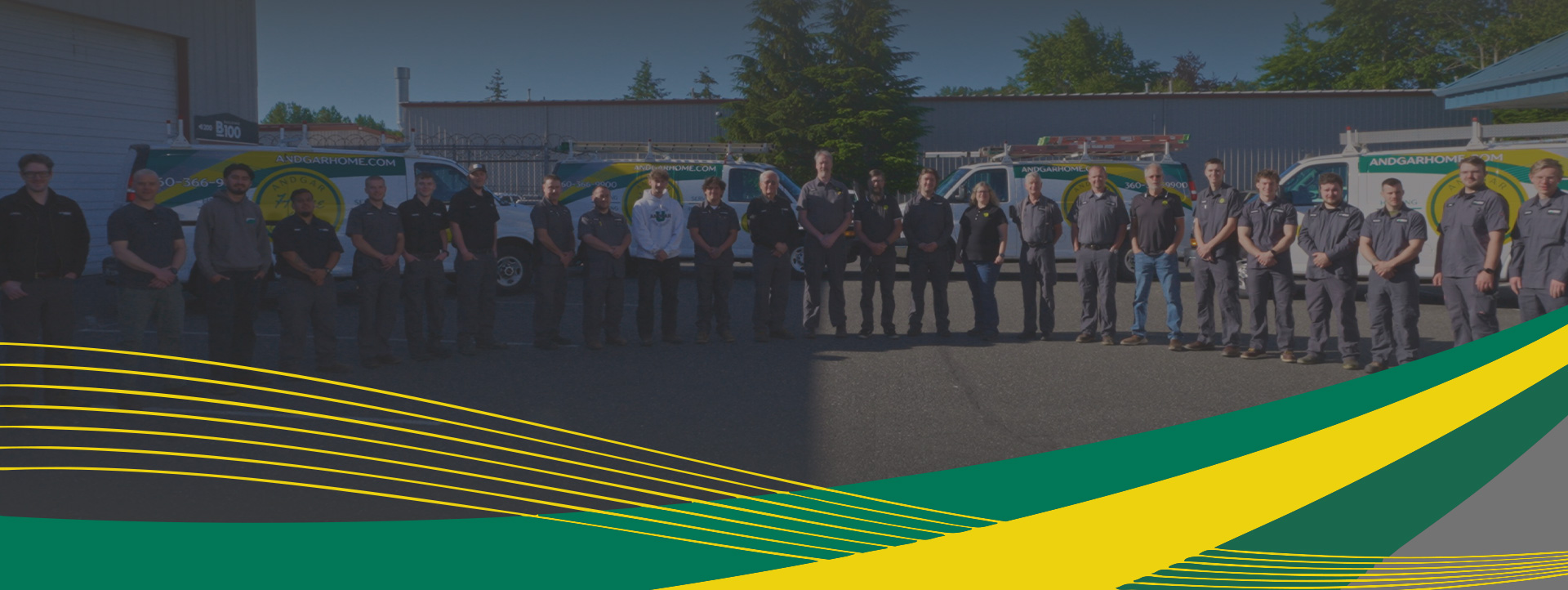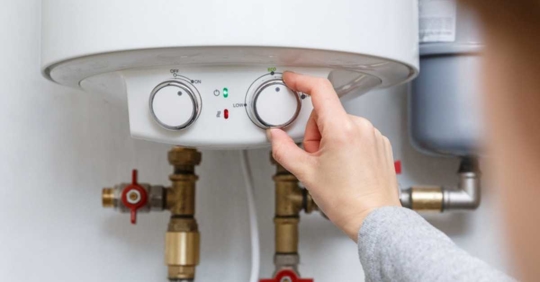When temperatures drop in Bellingham and the surrounding Skagit and Whatcom counties, a reliable hot water supply is essential There’s nothing quite like stepping into what you expect to be a warm shower, only to be met with an icy blast! If your hot water supply seems to dwindle or disappear during the colder months, you’re not alone.
This common issue can be a simple seasonal adjustment or a sign of a more significant problem. Don't let cold water ruin your day. Understanding why your water heater might be struggling and what steps you can take can make all the difference.
A cold water crisis shouldn't bother you this winter! If you're experiencing inconsistent hot water, reach out to Andgar Home Comfort today for prompt, reliable water heater service.
Why Do Water Heaters Struggle When Temperatures Drop?
It might seem counterintuitive, but colder ambient temperatures can significantly impact your water heater's performance. Here's a look at some of the primary reasons why your hot water might be less reliable when the mercury dips:
- Colder Incoming Water: During fall and winter, the water entering your home from the municipal supply or well is much colder than in the warmer months. Your water heater has to work harder and longer to raise this colder water to your desired temperature. This increased demand can strain the system and lead to a perceived shortage of hot water.
- Increased Hot Water Demand: With colder weather, families tend to take longer, hotter showers, run more hot water for laundry, and wash dishes more frequently. This surge in demand can quickly deplete your water heater's stored hot water, especially if it’s undersized for your household’s needs.
- Sediment Buildup: Over time, minerals in your water can accumulate at the bottom of your water heater tank. This sediment acts as an insulator, making it harder for the heating elements (in electric water heaters) or the burner (in gas water heaters) to efficiently transfer heat to the water. In colder months, when the system is already working harder, this inefficiency becomes more noticeable.
- Aging Water Heater: Like any appliance, water heaters have a lifespan. As they age, their efficiency naturally declines. An older unit, especially one that hasn't been regularly maintained, will struggle more to keep up with hot water demands, particularly when faced with colder incoming water.
- Thermostat Issues: A malfunctioning thermostat might not be accurately reading the water temperature or signaling the heating elements to turn on when needed. This can result in water that isn’t heated to its set temperature, making it feel lukewarm or cold, especially when mixed with colder ambient air.
- Pilot Light or Burner Problems (Gas Water Heaters): For gas water heaters, issues with the pilot light staying lit or a clogged burner can prevent the water from heating properly. Cold weather can sometimes exacerbate these existing issues, making the problem more apparent.
Understanding these underlying causes can help you determine whether your issue is a simple seasonal adjustment or a sign that your water heater needs a closer look.
Simple Solutions You Can Try First
Before calling in the professionals, there are a few straightforward things you can check or adjust that might resolve your cold-water woes. These tips are especially helpful for homeowners in Bellingham and the surrounding areas dealing with the typical PNW chill:
- Adjust Your Thermostat: Your water heater's thermostat might be set too low. A common recommendation is to put it to around 120°F (49°C). Be cautious about setting it much higher, as this can increase the risk of scalding and unnecessary energy consumption. A slight increase might be all you need to combat the colder incoming water.
- Reduce Hot Water Usage: While it's tempting to indulge in long, hot showers when it’s cold outside, being mindful of your hot water consumption can help. Staggering showers, running the dishwasher only when full, and using cold water for laundry when possible can make a big difference, especially for larger households.
- Insulate Your Hot Water Pipes: Insulating the hot water pipes leading from your water heater can help reduce heat loss as the water travels through your home. This relatively inexpensive DIY project can improve efficiency, especially if your pipes run through unheated areas like a crawl space or basement.
- Check for Pilot Light (Gas Water Heaters): If you have a gas water heater and suspect it's not heating, check if the pilot light is lit. If it's out, follow the relighting instructions usually found on a label on the water heater itself. If it repeatedly goes out, that signifies a larger issue.
- Examine Circuit Breakers (Electric Water Heaters): For electric water heaters, check your electrical panel to ensure the circuit breaker for your water heater hasn't tripped. If it has, flip it back on. If it trips again immediately, do not force it and call a professional.
While these steps can sometimes provide a quick fix, remember that they address symptoms rather than underlying problems. If your water heater continues struggling or you're uncomfortable performing these checks yourself, it's time to call in the experts.
When to Call a Professional for Water Heater Repair
Sometimes, the issue goes beyond simple adjustments or seasonal changes. If you’ve tried the basic troubleshooting steps and your water heater is still struggling, or if you notice any of the following, it’s definitely time to contact a professional plumbing service:
- No Hot Water at All: This is a clear indicator that something significant is wrong. It could be a failed heating element, a serious gas line issue, or a complete system breakdown.
- Discolored or Smelly Water: If your hot water is rusty, cloudy, or has a metallic or rotten egg smell, it could indicate severe sediment buildup, anode rod issues, or even bacterial growth within the tank.
- Loud Noises Coming from the Tank: Popping, crackling, rumbling, or banging noises usually point to excessive sediment buildup at the bottom of the tank. This not only reduces efficiency but can also damage the tank over time.
- Leaking Water Heater: Any sign of water around the base of your water heater is a serious concern. Leaks can lead to significant water damage and often indicate a failing tank that may need replacement.
- Pilot Light Frequently Going Out (Gas Water Heaters): If you constantly have to relight your pilot light, it could signal a problem with the thermocouple, gas valve, or a draft issue that needs professional attention.
- Frequent Short Cycling: If your water heater is turning on and off more frequently than usual, it could be a sign of a faulty thermostat, an undersized unit, or other internal issues.
- Advanced Age of Water Heater: If your water heater is 10-15 years old or more, its efficiency will naturally decline, and it may be more prone to breakdowns, especially under increased cold-weather strain. A professional can assess whether repair or replacement is the more cost-effective solution.
For homeowners in Bellingham, Skagit, and Whatcom Counties, addressing these issues promptly is key to restoring your home’s comfort and preventing more extensive problems down the line. A professional technician can accurately diagnose the problem and provide a lasting solution.
Preventative Maintenance: Your Best Defense Against Cold-Weather Woes
The best way to prevent your water heater from struggling when temperatures drop is through regular preventative maintenance. Think of it as a seasonal check-up for one of your home's hardest-working appliances. Professional water heater maintenance can include:
- Flushing the Tank: This process removes accumulated sediment from the bottom of the tank, improving efficiency and extending the life of your water heater. This is especially important in areas with hard water, like parts of our Bellingham service area.
- Inspecting Heating Elements or Burner Assembly: Ensuring these critical components are clean and functioning correctly is vital for efficient operation.
- Checking the Anode Rod: This "sacrificial" rod protects the tank from corrosion. Inspecting and replacing it when necessary can significantly extend the life of your water heater.
- Testing the Pressure Relief Valve: This crucial safety device prevents excessive pressure buildup in the tank. Regular testing ensures it will function correctly if needed.
- Examining for Leaks and Corrosion: Early detection of small leaks or signs of corrosion can prevent major water damage and costly repairs later on.
- Thermostat Calibration: Ensuring your thermostat is accurately calibrated helps maintain consistent water temperature and energy efficiency.
By investing in routine maintenance, you can catch minor issues before they become major cold-weather headaches, ensure your unit is running efficiently, and extend its lifespan. It’s a proactive step that pays dividends in comfort and peace of mind throughout the chilly months in Bellingham and beyond.
Don't let a struggling water heater leave you in the cold this fall and winter. If you're a homeowner experiencing reduced hot water performance or unsure whether the issue is seasonal or a sign of a bigger problem, the friendly and expert team at Andgar Home Comfort is here to help. We understand the unique challenges our local climate presents and are ready to provide the reliable, reassuring service you need.
Reach out to us today to schedule an inspection or service, and get your hot water flowing consistently again! Visit our online contact form or call us at (360) 614-4543.

